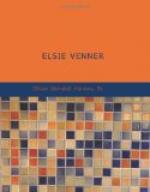There was not a great deal of study done that day. The young lady assistant had to point out to the new master the whole routine in which the classes were engaged when their late teacher left, and which had gone on as well as it could since. Then Master Langdon had a great many questions to ask, some relating to his new duties, and some, perhaps, implying a degree of curiosity not very unnatural under the circumstances. The truth is, the general effect of the schoolroom, with its scores of young girls, all their eyes naturally centring on him with fixed or furtive glances, was enough to bewilder and confuse a young man like Master Langdon, though he was not destitute of self-possession, as we have already seen.
You cannot get together a hundred girls, taking them as they come, from the comfortable and affluent classes, probably anywhere, certainly not in New England, without seeing a good deal of beauty. In fact, we very commonly mean by beauty the way young girls look when there is nothing to hinder their looking as Nature meant them to. And the great schoolroom of the Apollinean Institute did really make so pretty a show on the morning when Master Langdon entered it, that he might be pardoned for asking Miss Darley more questions about his scholars than about their lessons.
There were girls of all ages: little creatures, some pallid and delicate-looking, the offspring of invalid parents,—much given to books, not much to mischief, commonly spoken of as particularly good children, and contrasted with another sort, girls of more vigorous organization, who were disposed to laughing and play, and required a strong hand to manage them; then young growing misses of every shade of Saxon complexion, and here and there one of more Southern hue: blondes, some of them so translucent-looking that it seemed as if you could see the souls in their bodies, like bubbles in glass, if souls were objects of sight; brunettes, some with rose-red colors, and some with that swarthy hue which often carries with it a heavily-shaded lip, and which, with pure outlines and outspoken reliefs, gives us some of our handsomest women,—the women whom ornaments of plain gold adorn more than any other parures; and again, but only here and there, one with dark hair and gray or blue eyes, a Celtic type, perhaps, but found in our native stock occasionally; rarest of all, a light-haired girl with dark eyes, hazel, brown, or of the color of that mountain-brook spoken of in this chapter, where it ran through shadowy woodlands. With these were to be seen at intervals some of maturer years, full-blown flowers among the opening buds, with that conscious look upon their faces which so many women wear during the period when they never meet a single man without having his monosyllable ready for him,—tied as they are, poor things! on the rock of expectation, each of them an Andromeda waiting for her Perseus.
“Who is that girl in ringlets,—the fourth in the third row on the right?” said Master Langdon.




